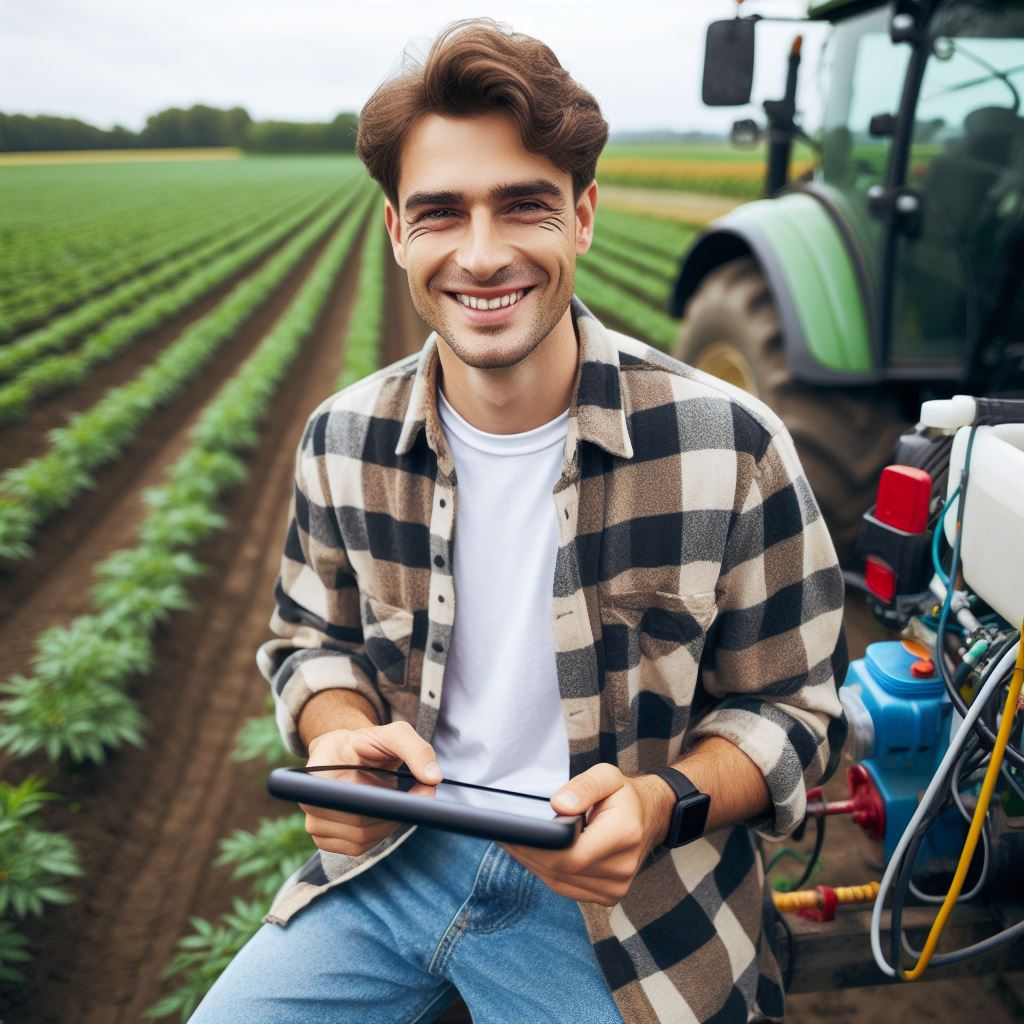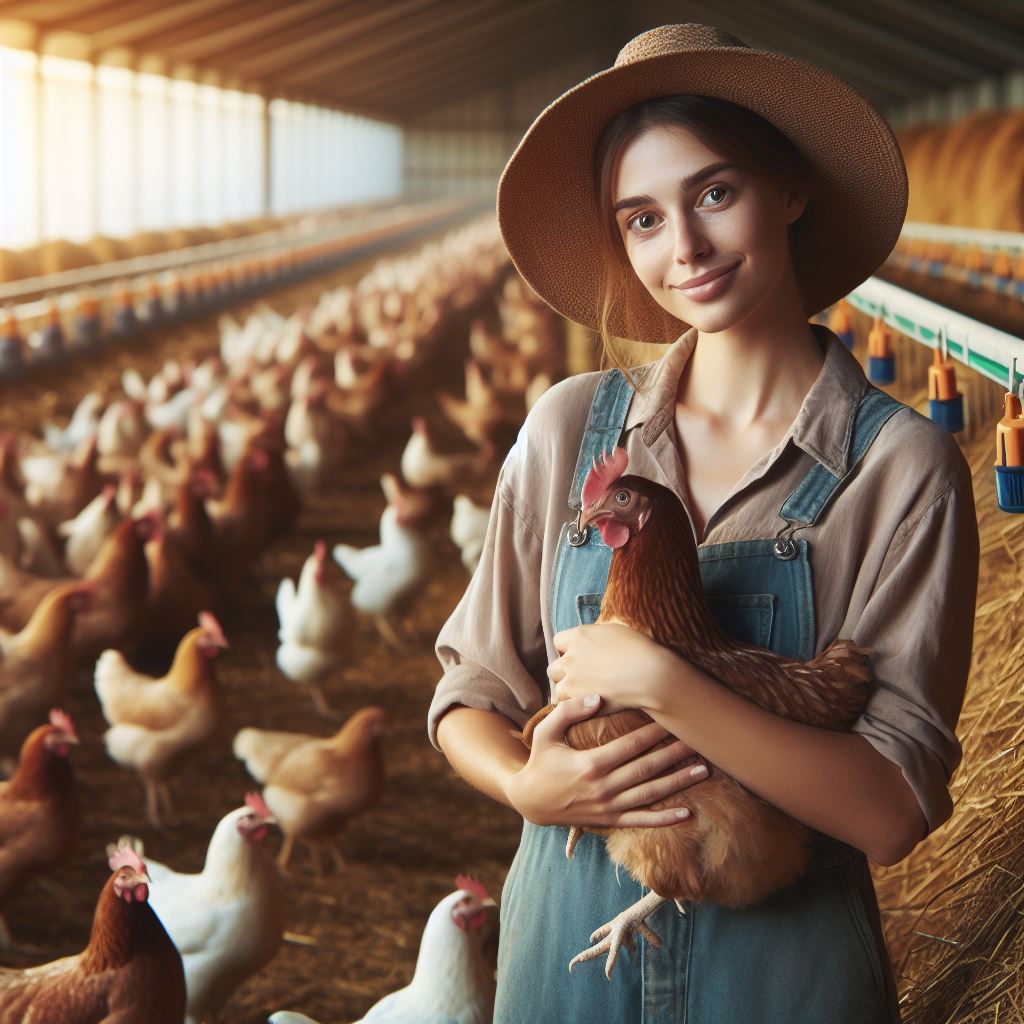Introduction
As we explore “Farmer Tech Plows to iPads” we will explore the specific use cases and benefits of iPads in modern farming, highlighting the transformative impact of technology in the agricultural landscape.
Farming has come a long way since its humble beginnings. In the past, farmers relied on manual labor and simple tools, such as plows, to cultivate their land and produce crops.
However, with the advent of technology, the face of farming has been transformed.
Modern farming is now heavily reliant on technology to maximize productivity and efficiency. Advances in various areas, such as machinery, irrigation systems, and crop monitoring, have revolutionized the industry.
These developments have brought about numerous benefits, from increased yields to reduced labor and resource wastage.
One of the most significant advancements in recent years is the widespread use of iPads in farming.
These portable devices have become essential tools for farmers, allowing them to access critical information and control various aspects of their operations remotely.
From the comfort of their tractors or even their homes, farmers can use iPads to monitor crop health, track weather patterns, and manage irrigation systems.
These devices enable them to make data-driven decisions and respond quickly to changing conditions.
Additionally, iPads provide valuable access to online resources and educational materials, empowering farmers with knowledge and support.
In fact, the transition from plows to iPads exemplifies the remarkable progress in farming technology.
Farmers have embraced these advancements to enhance their efficiency, productivity, and decision-making abilities.
Historical Context of Farming
Traditional methods farmers used in the past, including plows
- Farmers in the past relied heavily on physical labor and manual tools for farming.
- One of the most common tools used was the plow, which helped break up soil for planting.
- Plows were initially pulled by animals, such as horses or oxen, and later by tractors.
- These traditional methods required significant physical effort and were time-consuming.
Challenges and limitations of traditional farming techniques
- Traditional farming techniques were dependent on favorable weather conditions.
- Unpredictable weather patterns often lead to crop failures and economic losses.
- Manual labor limited the scale of production, hindering farmers from meeting high demands.
- Existing techniques were also inefficient, requiring excessive time and energy.
- Farmers faced difficulties in managing pests, diseases, and weed control effectively.
The need for technological advancements in agriculture
- Technological advancements are crucial to overcome the challenges faced by traditional farming.
- Improving productivity and increasing yield to meet the growing global population’s needs.
- Modern agriculture should be sustainable, environmentally friendly, and resource-efficient.
- Technological solutions can automate repetitive tasks and reduce the need for manual labor.
- Efficient management of resources, such as water and fertilizers, is vital for sustainable farming.
- Advanced machinery and tools can enhance precision in planting, harvesting, and crop maintenance.
- Incorporating technology allows farmers to monitor and optimize various farming parameters.
- Data-driven insights enable informed decision-making, leading to better overall efficiency.
- Embracing technology in agriculture ensures economic stability for farmers and rural communities.
Read: High-Tech Farming: A New Age Challenge
Technological Innovations in Farming
Overview of Technological Advancements in Farming
In recent years, the agricultural industry has witnessed incredible advancements in technology that have revolutionized farming practices.
These innovations have brought substantial improvements in productivity, efficiency, and sustainability.
Transform Your Agribusiness
Unlock your farm's potential with expert advice tailored to your needs. Get actionable steps that drive real results.
Get StartedOne notable advancement is the development of genetically modified crops, which have been engineered to withstand pests, diseases, and harsh environmental conditions.
This technology has significantly enhanced crop yield and quality, ensuring a higher return on investment for farmers.
Another significant breakthrough is the utilization of drones in the field of agriculture.
These unmanned aerial vehicles (UAVs) are equipped with high-resolution cameras and sensors that enable farmers to monitor crop health, identify problems, and optimize irrigation and fertilization practices.
Furthermore, the introduction of precision farming techniques has transformed traditional farming methods.
Precision agriculture utilizes global positioning systems (GPS) and geographic information systems (GIS) to precisely manage resources such as water, fertilizers, and pesticides.
This targeted approach minimizes waste and increases overall efficiency in farming operations.
Role of Machinery and Automation in Farm Productivity Improvement
Machinery and automation have played a vital role in enhancing farm productivity.
The use of mechanized equipment, such as tractors, combines, and harvesters, eliminates the need for manual labor, resulting in faster and more efficient farming operations.
Moreover, the automation of processes like planting, irrigation, and harvesting has led to increased accuracy and precision.
Farmers can now rely on advanced machinery to perform these tasks, ensuring optimum crop growth and yield.
Additionally, smart machinery equipped with sensors and artificial intelligence enables real-time data collection and analysis.
This data-driven approach helps farmers make informed decisions regarding crop management, leading to higher productivity and reduced costs.
Advent of Precision Agriculture and Its Impact on Farming Practices
Precision agriculture has revolutionized the way farmers approach crop cultivation and management.
By integrating advanced technologies like GPS and GIS, farmers can create detailed maps of their fields, allowing them to identify variations in soil composition, nutrient levels, and moisture content.
This precise mapping enables farmers to implement site-specific practices, such as variable rate fertilization and irrigation, tailored to the specific needs of different areas within their fields.
As a result, resources are efficiently utilized, resulting in optimal crop growth and minimized environmental impact.
Precision agriculture also enables farmers to adopt proactive pest and disease management strategies.
Through real-time monitoring of crops using sensors and satellite imagery, early detection of potential issues is possible, facilitating timely interventions and minimizing yield losses.
Integration of Digital Tools and Sensors in Farming Operations
Digital tools and sensors have become fundamental in modern farming operations.
- Farmers access diverse apps and software for precise weather forecasts, pest identification, and crop monitoring, enhancing agricultural practices.
- Sensors embedded in the field collect data on various environmental factors such as temperature, humidity, and soil moisture.
- This data is then analyzed, allowing farmers to make informed decisions regarding irrigation schedules, nutrient application, and overall crop health management.
- Moreover, the Internet of Things (IoT) integrates digital tools and sensors, enabling real-time data transmission and remote monitoring in farming operations.
- This connectivity offers farmers greater control over their crops, resulting in enhanced productivity and reduced resource wastage.
In short, technological innovations in farming have transformed traditional practices and propelled the agricultural industry into a new era of efficiency and sustainability.
From genetically modified crops to precision agriculture and digital tools, these advancements have revolutionized farm productivity and enabled farmers to make data-driven decisions for optimal results.
Embracing these technologies is crucial for the future of farming and ensuring food security on a global scale.
Read: Precision Agriculture: My Farm’s Success Story
Showcase Your Farming Business
Publish your professional farming services profile on our blog for a one-time fee of $200 and reach a dedicated audience of farmers and agribusiness owners.
Publish Your ProfileThe Emergence of iPads and Smart Devices in Farming
Introduction and Proliferation of iPads and Other Smart Devices in Agriculture
- The agricultural industry has witnessed a significant transformation with the introduction and proliferation of iPads and other smart devices.
- Farmers are now embracing technology to enhance productivity, efficiency, and profitability in their farming operations.
- iPads have become popular among farmers due to their versatility, user-friendly interface, and wide range of functionalities.
- These devices have revolutionized the way farmers manage their farms, collect data, and make informed decisions.
- The adoption of iPads in farming has been accelerated by the availability of various agricultural apps and software specifically designed for farm management.
Functionalities and Benefits of iPads for Farmers
- iPads provide farmers with access to a vast amount of agricultural information, including weather forecasts, market prices, and crop management techniques.
- Farmers can easily monitor their crops and livestock remotely through the use of sensors and cameras connected to their iPads.
- The devices facilitate real-time communication between farmers and agricultural experts, allowing for immediate troubleshooting and advice.
- With GPS capabilities, iPads enable farmers to accurately map their fields and plan the most efficient routes for planting, spraying, and harvesting.
- iPads also assist in inventory management, allowing farmers to track equipment, supplies, and livestock, reducing the risk of loss or theft.
Applications of iPads in Different Aspects of Farming
- In crop management, iPads provide farmers with precise data on soil conditions, irrigation needs, and nutrient levels, optimizing the use of resources.
- iPads are used in livestock management, enabling farmers to monitor the health parameters, feeding schedules, and growth patterns of their animals.
- These devices are utilized in agricultural research, facilitating data collection, analysis, and collaboration among researchers and field workers.
- iPads find applications in farm planning and budgeting, helping farmers estimate costs, plan crop rotations, and forecast yields.
- Agricultural education and training have also benefited from iPads, as they serve as interactive learning tools for farmers and agricultural students.
Revolutionizing Farm Management, Planning, and Data Collection
- With iPads, farm management has become more streamlined and organized, as farmers can access all necessary information in one device.
- The use of iPads in farm planning allows farmers to make data-driven decisions, leading to improved productivity and profitability.
- Data collection through iPads eliminates the need for manual recording, reducing errors and saving time for farm workers.
- Farmers can generate comprehensive reports and analyze trends in crop performance, resource allocation, and financial outcomes using iPads.
- iPads have empowered farmers to become more efficient, sustainable, and resilient in the face of challenges such as climate change and market fluctuations.
In essence, the emergence of iPads and smart devices has had a profound impact on the agricultural industry.
These devices, with their functionalities and benefits, have transformed farming practices, allowing farmers to manage their farms more effectively and efficiently.
From crop and livestock management to farm planning and data collection, iPads have revolutionized various aspects of farming.
With their continued integration into agriculture, we can expect further advancements and increased productivity in the future.
Read: Family Farming: Balancing Tradition, Change

Benefits and Challenges of Farmers Adopting iPads
Advantages that farmers can gain from utilizing iPads
- iPads provide farmers with access to real-time weather information, allowing them to make informed decisions.
- With iPads, farmers can utilize apps to track crop health, monitor irrigation, and detect pest infestations.
- The mobility of iPads enables farmers to manage their operations from anywhere on their farm.
- iPads enable farmers to access online marketplaces and connect directly with buyers, opening up new sales channels.
How iPads can improve operational efficiency, decision-making, and communication on the farm
- By using iPads, farmers can automate data recording, saving time and reducing human error.
- The ability to access and analyze data in real time allows for quick decision-making, leading to more efficient operations.
- iPads enable seamless communication between farmers, farm managers, and agricultural experts.
- Through video conferencing apps, farmers can receive remote guidance and support from agricultural specialists.
Potential challenges or barriers to adoption, such as cost, technical expertise, and connectivity issues
- The initial investment in iPads and necessary software might be a financial burden for some farmers.
- Not all farmers may have the technical expertise required to efficiently operate iPads and related apps.
- In areas with poor internet connectivity, using iPads and accessing online resources might be challenging.
Suggestions and strategies to overcome these challenges
- Government subsidy programs can help farmers mitigate the cost of purchasing iPads and adopting related technologies.
- Training programs and workshops can be organized to educate farmers about using and maintaining iPads.
- Farmers can explore alternative connectivity options like satellite internet to overcome connectivity issues.
- Collaborating with nearby farms or agricultural organizations can provide technical support and shared resources.
Explore Further: Her Soil, Her Story: Female Farmers’ Journeys
Success Stories and Case Studies
Real-life examples of farmers who have successfully incorporated iPads into their operations
Incorporating iPads into farming operations has proven to be a game-changer for many farmers across the country.
These success stories showcase the remarkable benefits and advantages that technology can bring to the agricultural industry.
John Smith, a dedicated corn farmer from Iowa, was initially skeptical about the impact of iPads on his farm.
However, after implementing iPads to track crop yields and analyze data, he experienced a notable increase in overall production.
The ability to identify areas of low yield promptly allowed him to take necessary measures to improve yields and optimize his farm’s efficiency.
Similarly, Jane Thompson, a dairy farmer in Wisconsin, found iPads to be a valuable tool for streamlining her farm’s record-keeping process.
The reduction in paperwork and administrative tasks allowed her to allocate more time and resources to the actual operations of the farm.
With clearer insights into milk production through the use of iPads, Jane was able to identify and address health issues in her cows more effectively, resulting in improved overall herd performance.
Unexpected advantages or lessons learned from their experiences
For organic vegetable grower Mike Johnson, incorporating iPads into his farming practices brought unexpected advantages.
Using iPads for inventory management and ordering supplies significantly streamlined the process, reducing waste and saving costs.
The simplified communication with suppliers improved the accuracy of orders, eliminating delays and mistakes.
Mike realized the importance of embracing technology to enhance the efficiency and profitability of his farm.
Outcomes and benefits these farmers have experienced
- These success stories showcase farmers’ positive outcomes with iPads, emphasizing valuable lessons learned in the implementation process.
- John Smith’s initial underestimation of data analysis capabilities through iPads proved to be a valuable lesson as it revolutionized his decision-making process.
- Jane Thompson’s experience underscored the need to leverage technology for clearer insights into farm operations, ultimately benefiting the health and performance of her dairy herd.
- Mike Johnson learned the importance of embracing technology for efficient communication and inventory management, enhancing business operations, and maximizing profitability
Basically, the success stories of farmers who have successfully incorporated iPads into their operations serve as inspiration for other farmers looking to modernize and optimize their practices.
The outcomes and benefits experienced by these farmers, including increased production, reduced paperwork, improved insights, and cost savings, exemplify the transformative power of technology in agriculture.
As technology continues to advance, incorporating innovative tools like iPads is essential in ensuring the sustainability and success of farming operations in the modern age.
Read: Young Farmers, Big Dreams: Their Stories
Future Trends and Possibilities
Potential future developments and advancements in farming technology
- Genetic Engineering: Scientists are working on genetically modifying crops to be more resistant to diseases and pests, thus increasing yields and reducing the need for pesticides.
- Vertical Farming: By using stacked layers, crops can be grown indoors and closer to consumers, reducing transportation costs and minimizing the impact on the environment.
- Precision Farming: This approach utilizes technologies like GPS and sensors to gather data on soil conditions, moisture levels, and nutrient content.
- Automated Machinery: Advanced machinery can perform tasks such as planting, harvesting, and fertilizing with precision and efficiency, reducing labor costs and increasing productivity.
Emerging trends such as artificial intelligence, drones, and robotics in agriculture
- Artificial Intelligence (AI): Drones with cameras and sensors monitor crop health, identify stress or disease, and precision spray pesticides, reducing manual labor and covering large areas swiftly.
- Drones: Drones with cameras and sensors monitor crop health, identify stress or disease, and precision spray pesticides, reducing manual labor and covering large areas swiftly.
- Robotics: Robots are being designed for farming tasks like weeding, planting, and harvesting, alleviating the physical strain on farmers and enhancing overall efficiency.
The potential impact of these technologies on the farming industry
- Increased Productivity: The integration of advanced technologies can significantly enhance productivity by optimizing resource utilization, reducing waste, and improving crop yields.
- Environmentally Friendly Practices: Precision farming and automation reduce chemical, water, and energy usage, fostering a sustainable and eco-friendly approach to agriculture.
- Cost Efficiency: By reducing labor costs and increasing efficiency, farmers can benefit from lower production costs, leading to more affordable and accessible agricultural products.
- Enhanced Food Safety: Genetic engineering and AI enhance food safety by identifying and addressing risks, ensuring higher quality control in the supply chain.
- Job Transformation: Advancing tech may reshape farming jobs, automating some roles but creating new opportunities in data analysis, robotics maintenance, and AI programming.
Generally, the future of farming technology holds exciting possibilities. From genetic engineering and vertical farming to AI, drones, and robotics, advancements are set to revolutionize the agricultural industry.
These technologies can revolutionize food production, boosting productivity, efficiency, and sustainability to address global challenges in feeding a growing population.
Embracing these emerging trends will enable farmers to stay ahead and thrive in the ever-evolving world of agriculture.
Conclusion
This blog discussed how farmers have embraced technology throughout history.
From plows to iPads, farmers have consistently adapted to new advancements to improve their farming practices.
It is important to emphasize the positive implications of technology for the future of farming. The use of technology has led to increased efficiency, productivity, and sustainability in agriculture.
As such, farmers and readers are encouraged to stay updated on technological advancements in agriculture.
By staying informed, farmers can take full advantage of the latest tools and methods to enhance their farming operations.
It is clear that technology has revolutionized the way farmers work and will continue to shape the future of agriculture.
By embracing technological innovations, farmers can ensure a more prosperous and sustainable future for the industry.
So, let’s continue to explore and embrace the ever-evolving world of agricultural technology!




